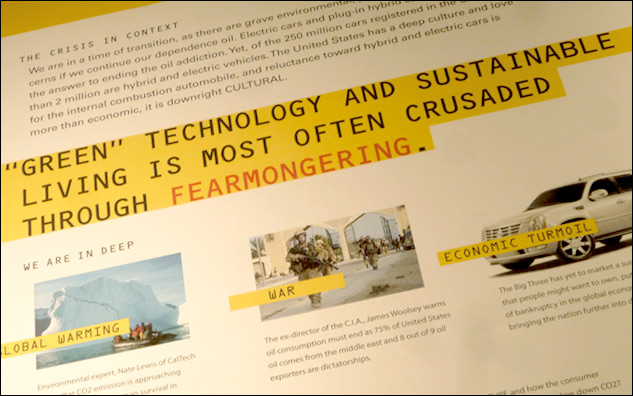

We are in a dire era of climate, oil and economic crisis. Environmental expert Nate Lewis of Caltech
states that CO2 emission is approaching dangerous levels for our human survival in the next 40 years.
The ex-director of the C.I.A. Robert James Woolsey warns oil consumption must end as 75% of United
States oil comes from the Middle East and 8 out of 9 oil exporters are dictatorships. The Big Three has
yet to market a successful electric car that people might want to own, putting them behind many foreign
car companies. While these reasons are legitimate, they are not an effective strategy for green motoring.
Of all the entrepreneurs, technologists, politicians, designers and environmental experts who spoke at the
2009 Art Center Sustainability Summit, there was almost no emphasis on popular culture's acceptance
of sustainable mobility. CULTURE MUST BE ADDRESSED to foster new aspirations and attitudes to these
green cars. In an intensely difficult time for the auto industry due to the recession in the last 2+ years,
car companies struggling to survive must create trust, value and desirability. As of this writing, the quality
control problems of the 2010 Prius (Toyota's halo green car) brake/acceleration defects further eroded many
people's trust in the reliability of hybrid cars. Many electric cars, such as the Tesla Roadster, are too
expensive for car enthusiasts to own. There are several concept electric cars that are desirable, but out
of reach for the average consumer. Electric cars and plug-in hybrid cars are touted as a valid answer to
ending oil addiction. Yet, of the 250+ million cars registered in the U.S., less than 2 million are hybrid
and electric vehicles. The United States has a deep culture surrounding love for the internal combustion
automobile, and reluctance toward hybrid and electric cars is more than economic, it is downright cultural.
______________________________________________________________________________
©2010 Yee Chan & Art Center College of Design
